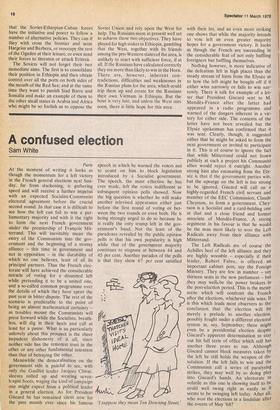A confused election
Sam White
Paris At the moment of writing it looks as though the momentum for a left victory in the French general elections next Sunday, far from slackening, is gathering speed and will receive a further impetus with an expected Socialist-Communist electoral agreement before the crucial second round. In that case it is difficult to see how the left can fail to win a parliamentary majority and with it the right to form the next French government under the premiership of Francois Mitterrand. This will inevitably mean the entry of the Communists into the government and the beginning of a stormy alliance — this time in government and not in opposition — in the durability of which no one believes, least of all its principal partners. Thus the French electorate will have achieved the considerable miracle of voting for a disunited left while pretending it to be a united one, and a so-called common programme over the details of which they have spent the past year in bitter dispute. The rest of the scenario is predictable to the point of being an almost mathematical certainty — as troubles mount the Communists will press forward while the Socialists, breathless, will dig in their heels and call at least for a pause. What is so particularly unlovely about this prospect is the sheer impudent dishonesty of it all, since neither side has the remotest trust in the other or any other fundamental intention than that of betraying the other.
Meanwhile the demoralisation on the government side is painful to see, with only the Gaullist leader Jacques Chirac, sleeves rolled up and wearing sevenleague boots, waging the kind of campaign one might expect from a political leader in a general election. As for President Giscard he has remained silent now for the past month ever since his famous
speech in which he warned the voters not to count on him to block legislation introduced by a Socialist government. The speech, the most effective he has ever made, left the voters indifferent as subsequent opinion polls showed. Now the big question is whether he will make another televised appearance either just before the first round of voting or between the two rounds or even both. He is being strongly urged to do so because he is really the only trump left in the government's hand. Not the least of the paradoxes revealed by the public opinion polls is that his own popularity is high while that of the government majority continues to stagnate at between 44 and 45 per cent. Another paradox of the polls is that they show 67 per cent satisfied with their lot, and an even more striking one shows that while the majority intends to vote left an even greater majority hopes for a government victory. It looks as though the French are succeeding in the considerable feat of not only baffling foreigners but baffling themselves.
Nothing however, is more indicative of the defeatism felt in high places than the steady stream of hints from the Elysee as to how the left might be bought off if it either wins narrowly or fails to win narrowly. There is talk for example of a letter that President Giscard sent to M. Mendes-France after the latter had appeared in a radio programme and warned of the dangers inherent in a victory for either side. The contents of the letter have not been revealed but the Elysee spokesman has confirmed that it was sent. Clearly, though, it suggested either that he might be asked to form the next government or invited to participate in it. This is of course to ignore the fact that while Mitterrand could not frown publicly at such a project his Communist allies would reject it outright. Another strong hint also emanating from the Elysee is that if the government parties win, but the upsurge on the left is too strong to be ignored, Giscard will call on a highly-regarded French civil servant and member of the EEC Commission, Claude Cheysson, to form a government. Cheysson is a Socialist and a card-holding one at that and a close friend and former associate of Mendes-France. A strong argument in his favour is that he would be the man most likely to woo the Left Radicals away from their alliance with Mitterrand.
The Left Radicals are of course the Achilles heel of the left alliance and they are highly wooable — especially if their leader, Robert Fabre, is offered an important cabinet post, say the Foreign Ministry. They are few in number — say thirteen seats in the new parliament — but they may well.be the power brokers in the post-election period. This is the messy scene which will confront the French after the elections, whichever side wins. It is this which leads most observers to the conclusion that the election will be merely a prelude to another election, possibly fought under a different electoral system in, say, September; there might even be a presidential election despite Giscard's apparent determination to stay out his full term of office which still has another three years to run. Although Giscard cannot block measures taken by the left he still holds the weapon of dissolution. If the left fails to win and the Communists call a series of paralysing strikes, they may well by so doing play into Giscard's hands. An electorate as volatile as this one is showing itself to be could well swing right as easily as it seems to be swinging left today. After all, who won the elections in a landslide after the events of May '68?


































 Previous page
Previous page